Book Reviews by Genre: Classics
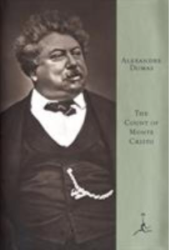
The Count of Monte Cristo" by Alexandre Dumas is a fantastic whirl-wind of unforgettable characters and interweaving story-lines that left me awestruck and yearning for an even deeper glimpse into this world of treachery, romance, adventure, and mystery. This book is as deceivingly witty as it is over-flowing charisma and has nestled its way to a special place in my heart as one of my favorite novels of all time.
The novel starts out with a scenic over-look of an Italian waterway in Marseilles as it carries along a lofty ship named Pharaon with one passenger in particular who is unlike any other named Edmond Dantès. A dashing young and honest man dawning with potential who has just returned with news that will change the course of his life, and the lives of many others, forever. He is falsely accused of traitorous activity and is sentenced to life on a prison located on an island off the coasts of Marseilles forcing him to leave behind his family, his friends, and the love of his life Mercédès. This marvelous tale unfolds within the walls of this prison and among its outer-walls as Dantès attempts to make a dashing escape with a kind mannered preacher. But, this is only the beginning of his tale. As the life of Dantès unfolds, so does the life of the many others who have been lucky enough to fall into his life.
This novel is truly unforgettable as it follows not only the life of Edmond Dantès, but also the lives of his lover, best friend, family, and even his partners from his shipping company. Filled to the brim with treacherous plots, revenge, heartache, mystery, and pirating; it also contains young love, faith that knows no bounds, and families filled with the knowledge that blood truly is thicker than water.
I would recommend this book to anyone looking to fall in love with not only a menagerie of unforgettable characters, but to a reader who is looking to fall head-first into a world that they will find themselves cherishing forever. Many blessings and happy reading : ),
Reviewer Grade Level 11.
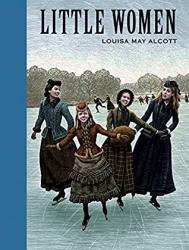
Little Women by Louisa May Alcott, an American classic, is one that rightfully deserves all of its fame. A coming of age story that follows four sisters living in poverty, I truly enjoy stories such as these, that slowly follow a "true to life" plot. I love how this novel unraveled each sister as a 3d character and worked through small, but super realistic day-to-day conflicts, while also addressing large societal issues at the time. Published in 1868, I enjoyed the issues this novel shed light on during those times, especially concerning stereotypes and the rights of women. Not being too preachy and upfront about these issues, I enjoyed how gracefully Alcott addressed these conflicts, utilizing the plot to weave these issues into, making the messages pack much more of a punch. Comparing this novel to other classics, however, I'd say that Little Women is not a very difficult read, and the novel is fairly simple to digest, which is something that I enjoy, especially in classics. I would recommend this novel to anyone since it's pretty much a globally known piece, and I think that every message in this novel holds value and merit to life now, as well as it did back then.
Reviewer Grade: 11
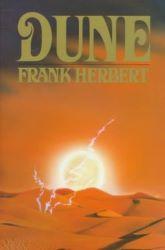
Dune is a sci-fi series written by Frank Herbert depicting detailed politics with twists and turns. The first one begins with the story of a boy called Paul, the son of a duke. His journey begins on Arrakis, a desert planet filled with a valuable resource called spice. When the duke’s palace is attacked, Paul must flee and find refuge in the desert. This book was entertaining for me, but it goes a little heavy into politics and there are a lot of things you need to pay attention to in order to understand the story. I lost interest in the overall series after the first 4 books as it just gets so weird with mystical stuff in the world. The genre it fits into is not scifi, but a mix between fantasy and scifi.
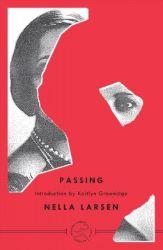
Passing by Nella Larsen is a classic novel following Irene Redfield and Clare Bellew. The novel follows the timeline of the Harlem Renaissance and delves into themes of 'white-passing' amongst the black community.
Irene, the narrator of the novel considers herself to be a very levelheaded, calm, thoughtful woman, who looks out for her children and is a perfectly attentive wife. Clare Bellew on the other hand is Irene's childhood friend, and her personality is much more colorful than Irene's. When Irene and Clare reunite after many years, we delve into their complicated relationship and clashing personalities.
Passing is a novel that illustrates what the standards of beauty really are and educates readers on the logistics of what passing of as white can mean for a black woman back in the 1920s.
I really enjoyed reading this novel, as 'white-passing' was something I wasn't super aware of, and barely even knew it was a phenomenon in the 1900s. Larsen also created a very interesting dynamic between Irene and Clare and crafted very realistic characters. I enjoyed reading Irene's inner monologues, as it's pretty rare to see an author build up very dynamic characters, that are also painfully human. I would recommend this book to pretty much anyone, as it contained lots of powerful messages and themes, without coming off as cliche or overdone.
Reviewer Grade: 11
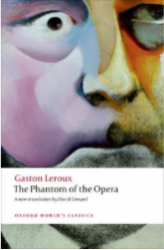
The Phantom of Opera by Gaston Leroux is actually a simple classic novel that is really beautiful yet an extremely compelling story in itself. As the very name suggests the book is about a Parisian Opera (Opera in Paris), that is apparently Haunted by an alluring and a mysterious Phantom.
The worst part is that the Phantom eventually falls in love with a soprano Christine Daaè which in the end causes a lot of trouble for the Parisian Opera House.
Anyhow let's get back to this book review. Though the story is actually all about romance and mystery it is also full of obsession and suspense. The book is a classic literature and a bit Broadway musical genre, it is perhaps not bad to say that the book is filled with a lot of suspense and almost an indefinite thought provoking moments that some would find very interesting, when some would find it awkward.
Even though the story itself does go deep into the Christine's childhood and the Phantoms backstory what we really enjoyed is the psychological aspect and angle of it. So, a lot of thrilling moments that will literally nail you to your stool or a bed while you read it.
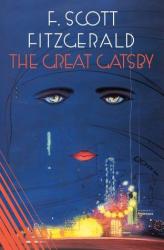
The Great Gatsby by F. Scott Fitzgerald, in my opinion, is a very confusing novel to say the least. Switching between past and present, we follow Nick Carraway who narrates the story from his point of view about the main character, Jay Gatsby. Gatsby is a millionaire that throws outrageous parties to anybody willing to come. Nick takes the reader through the journey of discovering who Gatsby really is, including his secrets and fears. The Great Gatsby is a classic novel that might just take a couple reads to fully comprehend.
Grade 11
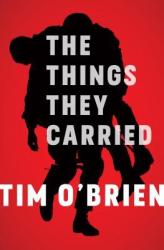
The Things They Carried by Tim O'Brian is a pretty good book about the Vietnam war. The book jumps around a lot with the characters in the war, after the war, and before the war. While it could be a little confusing at times, it was still an entertaining book. If you like reading books about Vietnam, but that also go in depth on the character, this would be a great book to read. Overall, I'd recommend this book!
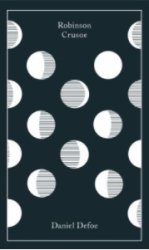
Review of Book R. Crusoe
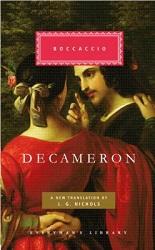
In plague struck Italy around the 1350s, 3 young adult boys and 7 teenage girls as well as their servants hide out in various castles while telling each other stories to pass the time. Each of them has to tell one story per day. For each day there is a new theme decided by the"ruler" of that day. These themes include; Misadventures with happy endings,Tragic loves, Bawdy loves, Munificence, and Avoiding Misfortune with witty remarks.
Though this is a good and classic book it is not for everyone due to it having mature sexual themes, so if you do not like such things either dont read this book or stick to the days that arent about things like those... also watch out for Dioneo's stories because he can say a story on whatever he likes. Alltogether a good book if not for everyone.

The Things They Carried by Tim O’Brien horrifically recalls Tim’s time during war, in what he calls “A true war story that isn't real”. This book recreates the experiences O’Brien went through during wartime, and is written in a very grotesque manner. The story jumps around from timeline to timeline, in a way that a lot of the time you aren't sure what perspective you’re reading from. While written very well, O’Brien has a habit of making every character seem like a horrific person and puts himself on kind of a metaphorical pedestal, in what seems to be an attempt to reconcile with the guilt he faced from the atrocities committed by him and his platoon. I would definitely recommend this book to others, despite its faults, but I believe the most important thing to know going into this book is that the events described are so grotesque they seem like made up fantasies or true stories that have been modified to seem worse than they actually are, which is part of O’Briens intention of telling the story the way he remembers it happening, not the way that it actually happened.
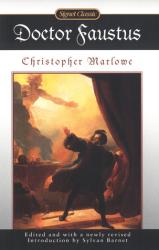
Doctor Faustus by Christopher Marlowe is an amazing study of enlightenment views on religion, morality, and social structure, all wrapped up in a fascinating tale of the supernatural. Doctor Faustus makes a deal with the Devil in exchange for power and knowledge, but, as a result, he constantly wars with himself. On one side, Faustus wants to repent his actions and avoid damnation, however, Faustus also is driven on by his greed and arrogance to pursue his dark arts and continue fulfilling his desires, visiting places such as the Papal and Imperial courts, leaving only after he has achieved his mischief. The story is amazing when considered within the historical context of its writing, the enlightenment philosophy and religious teachings show throughout the book, pitting the Old Testament views of damnation and repentance against the more forgiving views of the New Testament. I would highly recommend Doctor Faustus to those seeking to learn about the enlightenment and 16th century culture.
Harrison
Grade 12
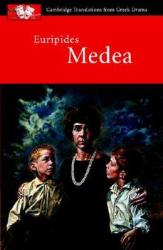
While the play Medea by Euripides probably invokes thoughts of classrooms and a literature teacher delivering lectures about themes and literary devices, the play itself is actually enjoyable to read and compare to modern times. Follow along after the tails of Jason’s journey with the Argonauts to capture the Golden Fleece and learn about Jason’s struggles for power and status within the culture of ancient Greece. Watch as Medea turns from a caring mother, wronged by her husband, into a villain, committing evil deeds and attempting to justify them in the name of justice. The play is an amazing window into Greek culture and Greek drama, and it is an enjoyable story for those who enjoy Greek mythology and want to learn how the Greeks communicated their stories to the people through plays.
Harrison
Grade 12
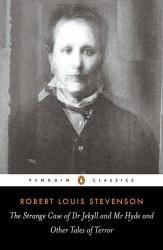
The Strange Case of Dr. Jekyll and Mr. Hyde by Robert Lewis Stevenson is a novel about a scientist in London, Dr. Jekyll, that has the misfortune of having to control and mask his alter identity, Mr. Hyde. After some unfortunate events partake, others begin to realize that the wise Dr. Jekyll has an alter identity. This novel has an unpredictable ending that left me stunned. I thought that the book was really good due to the continuously moving plot and the amazing characters that create a wonderous mystery throughout the book. I was required to read this book for school and I would definitely recommend it for readers that are in middle school and beyond that enjoy a great science fiction or mystery novel. Reviewer Grade: 9
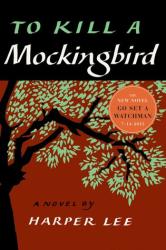
This book is in the top 10 definitely! To Kill A Mockingbird is a story of prejudice Jim Crowe South and the constant fight for justice. Jem is the older brother of 'Scout', a tomboy constantly trying to fit in with the big kids. In the story, they attempt to fight for a black mans rights in attempt to prove his innocence in a rape trial. I would highly recommend this book to middle and high schoolers. This book has a deep meaning of the powerful message that kids can have and their outlook in bad situations.

The Strange Case of Dr. Jekyll and Mr. Hyde by Robert Louis Stevenson is a novel about a scientist in London, Dr. Jekyll, who struggles with controlling his alter ego, Mr. Hyde. As he attempts to mask his other personality, horrifying events occur that present the horrible personality of Mr. Hyde. Other citizens begin to discover the connection between Dr. Jekyll and Mr. Hyde as the novel finishes with a jaw dropping climax and resolution. I was required to read this book for school and I would recommend it for readers middle school and above. I really enjoyed the progression of the plot and the ending that was unpredictable. Reviewer Grade: 9
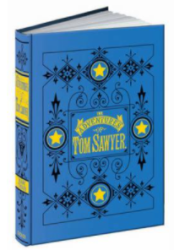
One of Tom's adventures. Really Good.
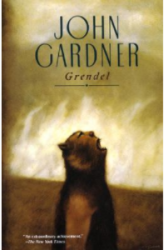
it was the worst book ever. pointless.
*spoiler alert* Beowulf is ugly and mean and rude and abusive and does not understand the concept of consent it made me cry for days what's the point of a book if it has the stupidest ending ever created.

To Kill a Mockingbird by Harper Lee is a novel about Jean Louise Finch (Scout), living through her father Atticus' controversial decision to defend a black man in court. Along with experiencing the tribulations of racism in her home town of Maycomb County, Scout, her brother Jem, and her friend Dill explore the curiosities of the town and investigate the mysterious Boo Radley. The plot gave me excitement to continuing reading, and the joining of the two plots at the end created a perfect ending to the story. I thought that the book was really good due to the knowledge that was gained about the history during the Great Depression and the progression throughout the book that helped develop the main character. This was a school required book, but I would definitely recommend it to readers in high school and above.
Reviewer Grade: 9
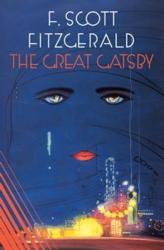
F. Scott Fitzgerald's "The Great Gatsby" begins with a straightforward introduction to its main character and narrator, Nick Carraway. Nick fancies himself a man of high morals and while he does not always succeed, he tries his best to adhere to his principles at all times. Nick comes from a prominent family in a middle western city; however, after fighting in the Third Infantry Division during World War I, Nick tires of the monotony of the Midwest and goes east — to New York — in order to learn the bond business and in pursuit of more adventure. Nick settles in West Egg, a village that is described best as housing those who are "new money," and is a direct counterpart to East Egg, home to New York's most elite. It is in New York that the we are introduced to Daisy Buchanan, Nick's cousin; Tom Buchanan, Daisy's husband and Nick's former schoolmate; Jordan Baker, the Buchanans' close friend and renowned golfer; and finally, to Jay Gatsby, Nick's neighbor and the titular character of the novel. Nick becomes entangles within the affairs (both literal and figurative) of these characters, as both his fascination and friendship with Gatsby grow.
At face value, "The Great Gatsby" may appear almost to be a soap-opera, but in truth, it is the very opposite. Much like its characters, beneath its shimmering facade, "The Great Gatsby" houses profound and poignant messages and themes — about societal roles, the ever-elusive American dream, and human nature.
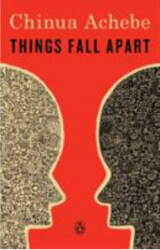
In things fall apart we met the main character, Okonkwo, who once gained fame and respect by his village of Umuofia. Okonkwo is an ambitious man within the Umuofia clan of the Igbo tribe. By the time the British colonial administrator arrives everything that Okonkwo holds dear becomes threatened after an accidental shooting. Okonkwo must flee with his family from his beloved village for seven years, losing the life that he worked so hard to gain. He gets through his seven years of exile only to go back home and discover that everything has changed. White missionaries have come to convert Africa to their ways. we liked Things fall apart because it had this idea that capture African culture, specially Nigerian culture. Okonkwo is an interesting character because his unwillingness to adapt to the new change represents an internal struggle many pre-colonized Africans faced in the wake of colonization. The ending is symbolic because it represents the ultimate death of culture as a result of European exploration. Overall, the writer tried to make us see how Africans struggle to keep their culture and identity from colonization.
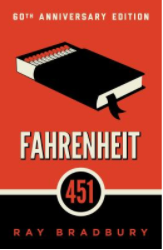
"Fahrenheit 451" is a short story that tells about Montag's transformation from finding a pleasure in burning books, to loving books and all the knowledge that comes with it. Montag lives in a society where the government has forbidden to read books and seek knowledge through writing. Montag is part of a group called "Fireman" who are supposed to put out fire, but that's not the case since they do the opposite. He lives with his girlfriend and has a bad relationship with her. They don't really talk and just look after themselves. Deep down, he cares for her, we'll find out when Montag gets home and see she's fallen over because of an overdose, where he called the ambulance and the police. At the end of Fahrenheit 451, Montag escapes the city and joins a small community of survivors who have successfully fled the repressive society and are dedicated to memorizing books. The group is moving north to start anew, and for the first time in his life Montag has a future to look forward to.
The short story is one of the few books I find interesting. Usually, I do not read many books and definitely not with the genre "dystopia". If you compare this short story to the society we live in right now, you can see they are opposite to each other so for me it is very interesting to hear how the people in "Fahrenheit 451" were dehumanized. The introduction was very boring, but the further you got into the short story, the more interesting it became. In the end, someone was really good. I still think this short story is relevant to us today because it proves what good conditions we live in, and I certainly appreciate more the privacy and freedom I have. "Fahrenheit 451" has a lot of themes, such as the power of books, because you can really see how much a book can have meaning. All the power a book may have manifested in this particular short story. There are also other themes, such as, Loss of Individuality, Role of Technology and ignorance and Knowledge. All these themes have an important meaning in this short story.
After I read this book, I was trapped by the dystopian world and all the social problems they had. I wonder a lot what our society would look like if the government had banned reading books, would I have read this?
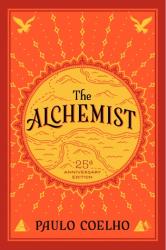
The Alchemist is a novel about Santiago a shepherd boy, who goes on a journey to find treasure. I've heard lots of hype around this story, but I have to admit that this story did not live up to its name.
Sure, the writing was pretty good, but I could not find myself getting into the story at all. I wasn't connected to any of the characters, and I couldn't care less about what happened to them.
Maybe this novel wasn't exactly meant to have a detailed and structure plotline, since it was more of a metaphorical piece, but the journey the main character took throughout the novel was written in such a way that made it completely uninteresting. The writing was more philosophical and seemed more like a long lecture rather than an actual story. Maybe I missed something, but as much as I wanted to like this book, I couldn't. Toward the end, I found myself only skimming the pages to skip to the end and get the story over with.
Maybe the experience with this book is different for everyone, but I'll have to say that it was definitely not for me.
Reviewer Grade: 11
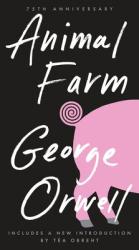
Animal Farm by George Orwell is an allegory about a farm of talking animals that push out their farmer after the abuse that they endure and proceed to create their own form of government. The animals form their government without the realization of the need to work for survival and have to adapt to the situation which causes discrepancies and arguments. I thought that this book was really good due to the surprising climax, ruthless betrayal, and the historical relation that it contains, but it does have some dragging parts. The plot is unpredictable and very interesting throughout. I had to read this book for school and thought it would be boring, but after reading it I gained knowledge of history through symbolism and recommend this book for history enthusiasts such as myself. Reviewer Grade: 9
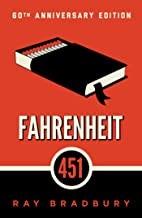
Fahrenheit 451 by Ray Bradbury is a dystopian novel about Guy Montag; a firefighter in a world that has illegalized books. His occupation results in burning books that are found in citizens' homes and after witnessing a woman that was burned with her books after refusing to leave them, Guy has a disturbing realization of his society. The progressive plot gave me the excitement of coming home and reading while the ending left me in a jaw dropping manner. I thought that the book was amazing due to the mysterious plot and the relations it has to our world today. I had to read this for school and thought it was going to be boring, but in the long run it became one of my most favorite books I have ever read and I would definitely recommend it for readers who love dystopian novels. Reviewer Grade: 9
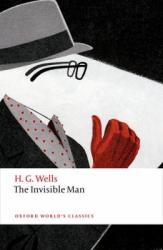
The Invisible Man by H.G. Wells is a science-fiction novel about a man in England in the 1800s who creates a way to make himself completely invisible without a way to change it. The life of a scientist named Griffin, who uses his invisibility for harm, is described throughout the book with an unpredictable ending. I selected this book for a school report, but I would definitely recommend the book to read if wanting a novel that keeps you on edge and wanting more. I thought that this book was pretty good due to the mysterious plot and ending though there were some dragging parts. I believe it is worth the wait for the surprising ending that left me in shock.
Reviewer Grade: 9

"The Invisible Man" by H.G. Wells is a gothic literature novel about an albino man in the 1800s who turns himself invisible. The book follows his journey through England as he commits a multitude of crimes and inevitably gets caught and killed. I didn't like reading it because I felt it was boring, and it was hard to keep reading since I had a strong dislike for the main character. Despite not liking the novel, I read it for school during our gothic literature unit, and it is a good example of gothic literature. "The Invisible Man" isn't surprising but rather shocking because the invisible man's actions are so abnormal. It could be relatable if you were wronged by someone or something and want to take revenge on them. It's not one of the best books I've read this year.
Introduction , imprint, synopsis, genre, central theme and evaluation
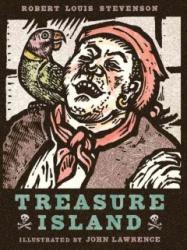
Treasure Island by Robert Louis Stevenson is an amazing book filled with suspense and action to no end. It follows the story of a boy named Jim Hawkins, whose life takes a turn after buccaneers turn his quiet inn life upside down. He is whisked on a voyage after learning of a "treasure island". After overhearing a conversation between some of his most trusted friends, Hawkins has to find a way to fix the voyage-and stay safe! Treasure Island is filled with twists and turns that will certainly keep you on edge for the whole book! Check it out, you'll definitely enjoy it.
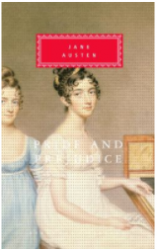
Really Good.
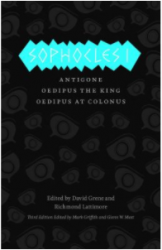
Very good.